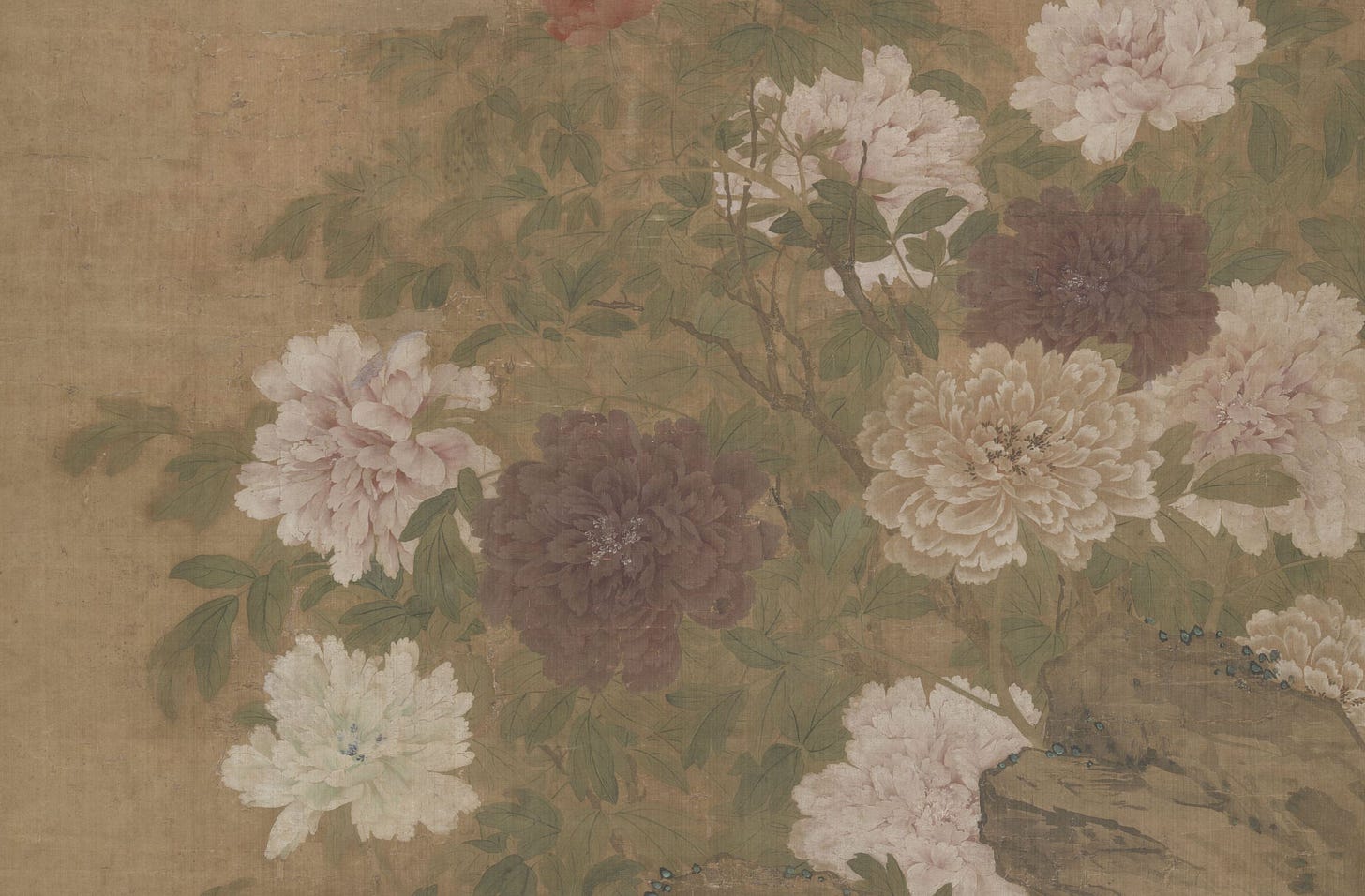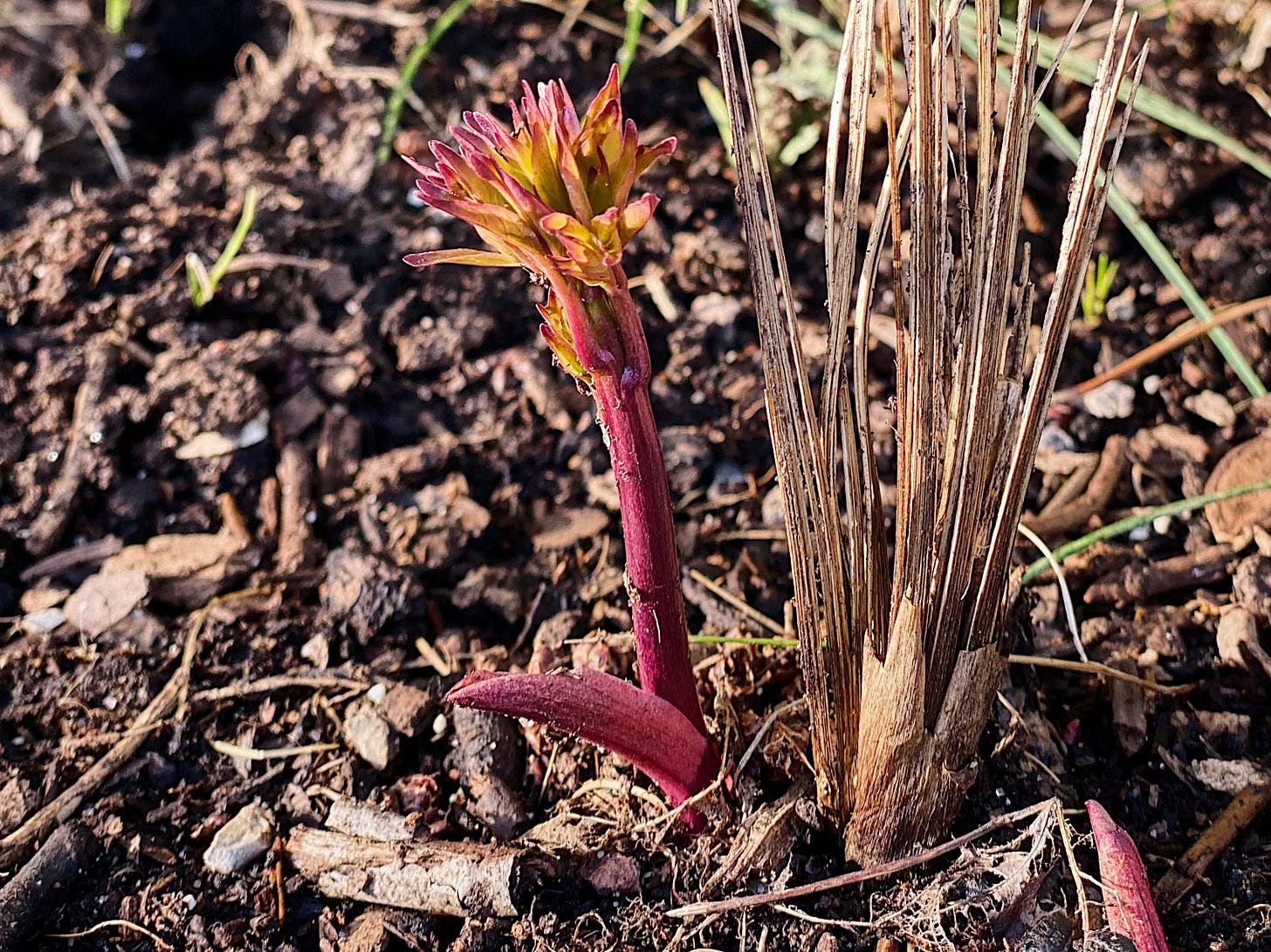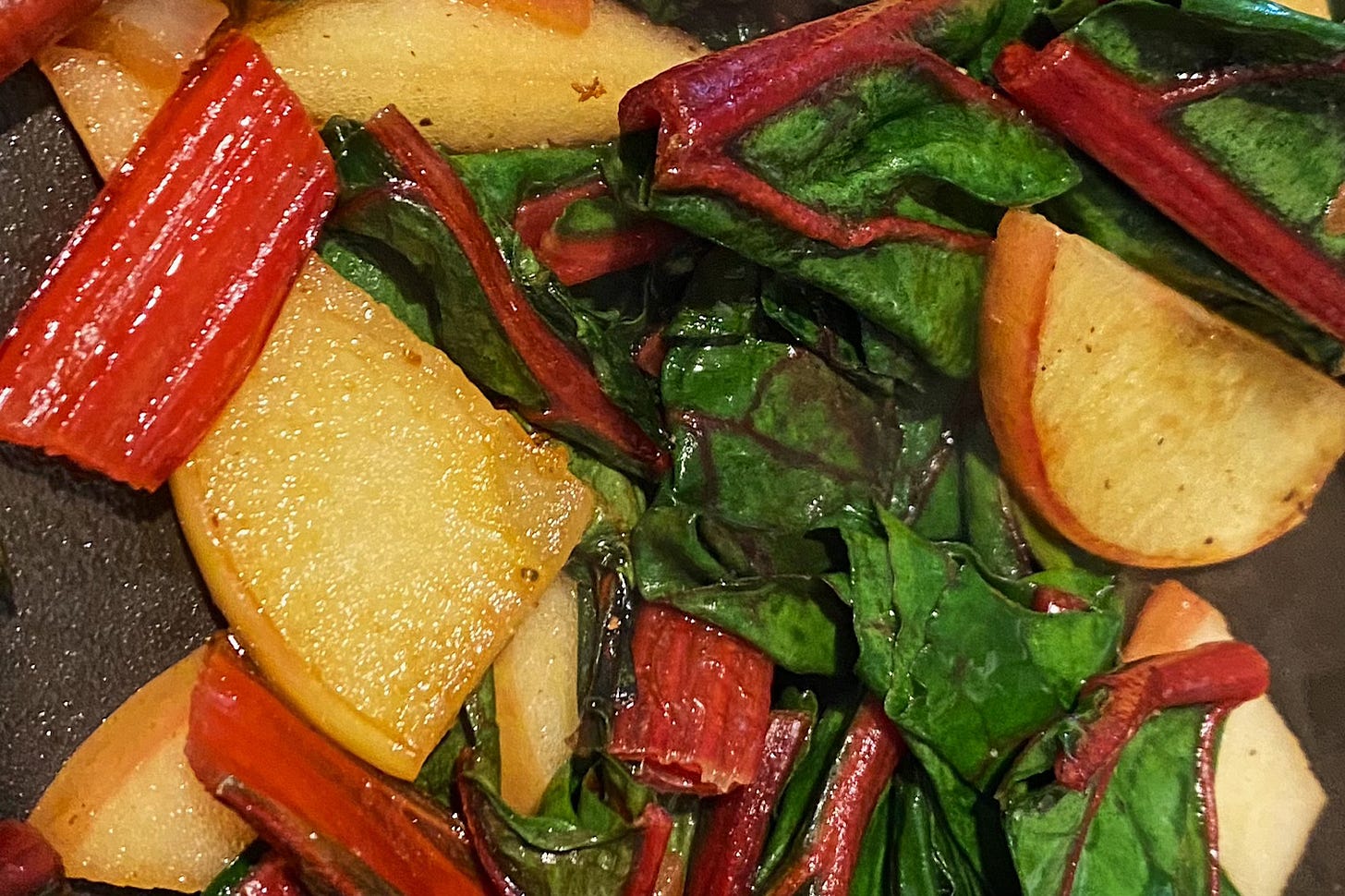Regarding the Peony
Some fragmented thoughts on a legendary flower, receiving my COVID-19 vaccine, sautéed chard and apples, and the epidemic of loneliness
Thursday, April 15
Grand Rapids, Michigan
Hello, friendly reader.
About a month ago, on an unseasonably warm day, I dug some holes in our front yard and planted peony roots. My mother had sent them from her own garden in Nevada.
Planting something your mother sent you comes with an added layer of pressure—I might have whispered, “Please don’t die,” with extra urgency—but I was delighted for the gift: The peony is one of my favorite flowers. I guess that just makes me a stereotypical Chinese person. My people have long treasured the peony, which is sometimes called 花王—the “king of flowers.” Its history in our culture goes back millennia. It was planted in the emperor’s gardens. It appears regularly in Chinese poetry, in paintings, and in the elaborate embroidery of silk brocade—an object of wonder that represents longevity and wealth, beauty and honor, flourishing and hope.
A few days after I planted the roots, I noticed that one had been dug up. Who was the culprit? A squirrel? A rabbit? I placed it back into the ground, rearranging the soil and patting it down. A couple of days later, the root had been unearthed again; something had nibbled at it too. Once again, I placed it back into the ground, attempting to reroot it more firmly than before. My garden nemesis and I have repeated this ritual three, four, five times in the subsequent weeks. I still don’t know who’s doing it. I’m still trying to make that thing grow.
Planting anything comes with risk and requires faith in elements beyond yourself. You trust—in the rain, in the sunshine, in processes invisible to the eye, in powers that you can’t control.
Maybe it was an intentional distraction that I had peony planting on my mind last week as I went to the local health center for my checkup as part of the Johnson and Johnson/Janssen COVID-19 vaccine trial. I was nervous: On this visit, in addition to the usual blood draws and nasal swabs, I’d meet with a study doctor to be told whether I’d received the placebo or the trial vaccine back in December.
The study doctor and I got to chatting after I sat down in his office. We joked that the trial could have yielded rich insights into human psychology. He had taken to asking people whether they thought they’d gotten the placebo or the vaccine—and he found the responses fascinating. A few people had experienced significant side effects after receiving their shot, so they suspected that they had gotten the real thing. Most people claimed no certainty either way. One man, though, was absolutely sure that he’d received the vaccine—so sure, in fact, that he told the doctor not to bother looking it up in the database. Sure enough, the man had received the placebo.
The study doctor asked me what I thought I’d gotten. I said I honestly really didn’t know. He smiled, clicked here and there on his computer, scanned the screen, and then said: “You got the placebo.” (Side note: When one of my seminary buddies learned that I hadn’t gotten the real vaccine, he said, “The Reformed kid was not one of the elect lol.” Well played, friend. Well played.)
I didn’t expect to feel like a loser, but I did. Why did it feel as if I had failed? Why did this revelation take me back to fifth-grade P.E., when I consistently got picked last for the kickball team? I know the parallel makes zero sense at all, but sometimes, feelings don’t make sense either.
Everyone in the study who had gotten the placebo was then given the opportunity to receive the vaccine. “Do you want it?” the study doctor asked me. I found this question absurd. Of course I wanted it. “Do some people not want it?” I asked him. He said that he’d been surprised by the number of placebo recipients who had opted out of getting the vaccine. The reason most commonly cited: YouTube videos that had convinced them that it wasn’t worth the risk.
A few minutes later, I got my shot. Receiving the actual vaccine felt so different from getting the placebo. I mean that physically: Where the salt water had felt like not much of anything, there was a viscosity, a thickness, to the vaccine as it made its way into my arm. But I also mean that emotionally: I knew what I was getting this time—and that knowledge made a huge difference. This wasn’t just an impotent adenovirus, rigged to trigger something in my immune system. This was also an injection of possibility, a dose of hope.
My sense of possibility, my hope, were contingent on another thing: my trust. Of course there’s risk. Of course it makes us vulnerable to something most of us don’t fully understand. And some of us just can’t conjure that trust. Given the experiences of many in our society, especially those who have felt let down by the system and particularly those in communities of color, which have been not only neglected but also abused, I get the skepticism and the fear. It’s natural that some of us prefer the semblance of control to the reality of surrender.
To live in an interdependent world, though, means to live with the truth that we all depend on forces beyond our control. We need help that’s beyond us, and we overestimate our individual power at our own peril. That’s part of being human. That’s part of existing as a creature, in community with other creatures.
Maybe that’s another reason I was thinking about peony planting. To plant is to risk, and to plant is to trust. We believe that a plant is resilient, but we also know it can’t survive just on good wishes and abundant hope. We surrender the fragile roots to the soil’s embrace, to the sunshine and to the rain, to the mysterious movements of microscopic elements and the wondrous alchemy of nature’s processes. Given the right resources, the plant can flourish.
There’s an ancient fable about Wu Zetian, a capricious, cunning 7th-century empress. In her teens, Wu was summoned to the Imperial Court to become a concubine. Once there, she schemed and killed her way upward, eventually claiming the throne herself—the only woman in Chinese history to rule in her own right.

One year, the Empress, drunk on power and impatient for pleasure, decreed that all 100 varieties of flowering plant in the imperial garden should bloom in midwinter. Only one declined to do so: the peony.
In her fury, the Empress decreed that peonies be eliminated from the imperial garden, exiling them all to be replanted in a distant city. I don’t get why she didn’t just have them destroyed, except that it would make for a less interesting story. Post-transplant, the exiled peonies did what they were designed to do, summoning strength from the sunshine and the rain and flowering even more beautifully than in any season before.
Hearing of their defiance, the enraged Empress ordered that all peony plants be burned to the ground. Obviously she’d never gardened—she’d only had gardens tended for her; if she’d known anything, she would have ordered the plants uprooted first. But all she had was her foolish anger and her lust for instant gratification. The peonies had deep roots and good soil. A year later, they sprang back to life, blooming once more.
It’s an imperfect metaphor—and don’t overread the story. I’d just like to believe that humanity can be like those ancient, legendary peonies: resilient, patient, having the humility to acknowledge that we have to go beyond ourselves to supplement what we already have within, steadfast in our pursuit of flourishing.
Several of my peonies have sprouted in the past week, though the one that my garden nemesis dug up hasn’t. But I haven’t given up yet.
What I’m Growing: Last year, I didn’t plant much outside until the community garden opened up in mid-May. But lots of things ought to go in the ground earlier in the spring. We have one bed in our backyard, where the spinach and the bok choy are starting to come up. No sign of carrots yet. The sage and the chives from last season have sprung back up, and some garlic that I forgot to harvest is looking good too. Because our yard isn’t big, I also decided to experiment with some odd spaces. This week, I planted some potatoes on the side of the house. And along the fence in the backyard, I cleared away some grass, digging the roots out as best I could, and I planted some snap peas. I figure the fence can serve as support. We’ll see if it works!
What I’m Cooking: One of our go-to easy, vegetarian meals for a weeknight: frozen pierogis, which we get from a stand at the farmers’ market that specializes in Polish food. Pan-seared, they’re ready in about 15 minutes. Often, I’ll sauté some greens to go with them, and then we’ll top it all with Greek yogurt and applesauce. We had some lovely chard in the fridge, but we’re out of applesauce. I did find one Honeycrisp apple, though, and I thought: Hmm... What if I just cut that up and sauté it with the chard? With some salt, some freshly ground pepper, and a squeeze of lemon juice, it was perfect. Honeycrisps were bred to hold their crunch, so they don’t turn to mush in the hot pan. I think this side dish would pair wonderfully with a pork chop.
What I’m Reading: It shouldn’t be surprising that a society that so overvalues independence should also be suffering from an epidemic of loneliness, which has been compounded by the isolation of the pandemic. I really appreciated this reporting from the Associated Press, which highlights some efforts to combat loneliness. Take the time to reach out to someone you treasure; it only takes a few seconds to type out a text, or a minute to scribble a postcard, and it will mean so much to the person who receives your words and your care.
It has now been a full year since I started writing you these weekly letters. For the first 15 years of my journalism career, I wrote almost entirely under the banners of magazine brands—first at Time, then at Conde Nast, then at Fast Company. It’s been a strange endeavor to try to find my own voice—and to trust that what I care about will matter to someone out there. I’ve missed a week here and there, but otherwise, it’s been a good discipline to write both when I’m feeling it and when I’m not. I hope you’ve found these letters helpful.
Thank you for reading, thank you for sharing your comments and observations, and thank you for accompanying me through these strange days. It would be great to know what you like, what you don’t like, what you’d love for me to write about, and where you’d like to see me dig deeper. Please leave me a comment—or, if you’re shy about public spaces, send me an email: makebelievefarmer@gmail.com.
I mean it when I say I’m so glad we can stumble through all this together—as I’ve said before, we were made for community—and I’ll try to write again soon.
Yours,
Jeff







I love your letters. They feel like a “letter from home.” I’m getting weirdly emotional writing this...thanks for your honesty, vulnerability, and kindness.
Hi Jeff , i just recently was introduced to the “ Evolving Faith “ podcast which is where I came to know about you. What a gift. After listening to your theology of composting I searched around on other podcasts to listen to your courageous and grace-filled words . Thank you for daring to speak up and to share your voice with us . As a 62 year old , married , white , Christian woman , eager to expand my theology , you have truly been transformative. A balm for the soul. Truth and peace .
Please keep writing .